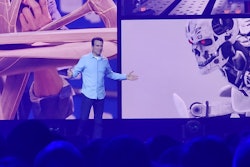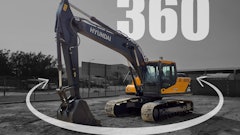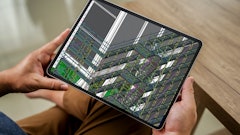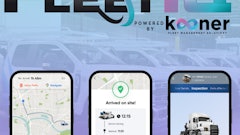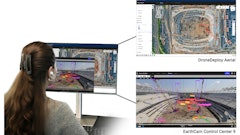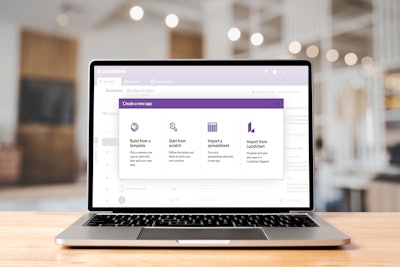
Boston-based Quickbase on October 4, 2023, announced the availability of Quickbase AI, a suite of AI capabilities embedded into the Quickbase platform to expedite the development of effective applications that solve business problems. These AI capabilities are now available on a limited basis across the Quickbase platform, both for existing and prospective customers; already, more than 1,000 applications have been built using Quickbase AI.
Included in Quickbase AI are:
- Smart Builder: a generative AI app builder that captures user-defined descriptions of business problems through natural language processing to identify data sources and approaches that can address these problems appropriately.
- Data Analyzer, which identifies and predicts key outcomes by identifying unseen patterns across data, regardless of where that data is stored (hybrid, relational or graph databases), creating an integrated and simplified data user experience to discover opportunities (or threats) impacting optimal business performance and outcomes.
- Data Scanner: a proactive data governance and protection tool that uses machine learning to scan for patterns and outputs across silos and applications for easier and faster classification, removal and/or protection.
Quickbase AI is available now for trial.
More Quickbase for Construction News
But the pace of research and development at Quickbase is such that this is not the only new feature in the product, according to Quickbase Fellow Solutions Consultant Peter Rifken.
“We've released dynamic work management as a market strategy, which aligns very closely to the kind of the challenges we see in the construction space,” Rifken said. “We've taken a lot of the problems in construction and put a whole narrative around [them] as far as what we call hyper fragmentation, which in this industry is the accumulation of collaboration tools, central ERPs (enterprise resource planning software applications) and project management software. But then, there is still all this grey work and Excel-based work, and that happens in between these tools.”
To address this, Quickbase has worked to bring those tools and systems together, helping mitigate the disconnects caused by cloud sprawl—the proliferation of multiple software-as-a-service (SaaS) systems and siloed activities in Excel.
Quickbase in June 2023 also purchased Merge Mobile for its flagship product, FastField Mobile Forms, which allows for simplified data collection and custom workflow automation. Using this functionality, users can:
- Build and deploy dynamic mobile forms that capture data from the field in real-time or offline, when a connection is not available
- Manage tasks and trigger automated workflows for processes including inspections, work orders, on-site surveys and safety audits
- Make enhanced use of the native features of their handset, like phones and geolocation, as citizen-developers can now create native mobile apps that understand their operating environments
“(FastField) really addresses one of the things our customers have been asking us for for years, which is to bring no-code to building mobile solutions for everyone in the field,” Rifken said. “So, a lot of safety workflows, incident tracking, timesheets—all the things that are so custom and specific and nuanced for construction. We're now giving the knowledge workers in this space the ability to build really end-to-end solutions, where FastField does the field-based work, the inspections and audits, and then we bring it into QuickBase.”
Quickbase had a native application prior to FastField, but it consisted of an app version of Quickbase that could be downloaded from public marketplaces. Within this app, the software applications that customers built in Quickbase were available for use on a mobile device.
“What FastField brings to the table is a mobile-first tool that does things like signature capture, GPS, offline data entry, workflows and dispatching of work” Rifken said. “Users that really need that kind of tool spend most of their time in their field. They are climbing up on a pole and doing auditing and checklists. They're out in the field doing surveys. So what they need is the ability to capture images, annotate images, do signature capture, do geolocation, that kind of stuff.”
Quickbase and FastField are tools that nonprogrammers can use to create their own purpose-built enterprise software applications. Both benefit from a library of predeveloped content contractors, and others can use as-is or as a starting point for their own application. Quickbase’s construction-specific offering grew with the 2022 acquisition of its service partner MCF Solutions.
“We provide a lot of reference templates, reference architectures, things that are [a] starting point for—call it a safety inspection, call it a checklist, call it an installation,” Rifken said. “You want to give someone a starting point, but then you pull it up, and you add your own fields; you switch around the order; you add sections. So a lot of what our customers want is flexibility and customizability. They like to take things that are templates, that are 80% or 60%, and then add the things that are business-specific. And that's where Quickbase really shines—we’re going to allow you to get exactly the process you need for your business and work around the tools you've already invested in with tight integration that's bidirectional.”
Learn more with our full IRONPROS video deep dive on Quickbase for construction.
AI for No-Code Construction Software Ideation
While other construction software companies are adding AI to address functions like go-no-go decisions, estimating, planning and other core processes, Quickbase has harnessed it to make the no-code development process more intuitive. In essence, Quickbase is using AI to connect the dots between business problems users are trying to solve and the underlying data sources available that can comprise the solution.
“In construction, what I find is you’ve typically got one CIO and maybe a couple of analysts around them,” Rifken said. “Sometimes you have a little bit more mature of a technology organization, and they have a lot of what we call knowledge workers [who] know the problem they're trying to solve. They know the business process, and they might be savvy with Excel. But they're constantly working to find solutions to problems. As fast as it is to build in QuickBase, it still requires someone to go in and know what their data model is and their processes … And what AI has done for us is given us the ability to just describe the problem [we're] trying to solve. What are the things you're tracking on the job site? Maybe you’re tracking materials, tracking equipment, tasks or projects. So we're giving you an interface now to talk to something, describe your problem. And then we are building out the entire data model. We are adding data to your environment and building example reports and charts. And so we're starting you with a very rich environment to solve a complex set of problems."
BOTTOM LINE: When we talk to contractors, we hear Quickbase mentioned frequently as a tool for preconstruction. The need to zip together multiple applications that may touch sales, owner requirements discovery, design, estimating, collaboration, planning and scheduling would seem to make it a fit. Quickbase marketers talk a lot about the amount of grey work in construction, and an orchestration tool like Quickbase is aimed at exactly this scenario. There are of course purpose-built solutions that do this for preconstruction, like ConCntric, collaboration platforms like Planhub and tools like Toric that can also clean, scrub and harmonize data from different sources. The ability to extend further into the work in progress phase of the project bodes well for Quickbase, as does its ability to deliver unique solutions for contractors with a specific vision, all while providing an increasing amount of capability, according to Rifken, for governance of the application and business processes. Quickbase is that attractive middle ground between homegrown construction software and packaged construction software, and if you are the type of construction business that thinks its secret sauce is too special to be handled by a commercial-off-the-shelf product, Quickbase has among no-code platforms shown in the market that it is serious about construction.





